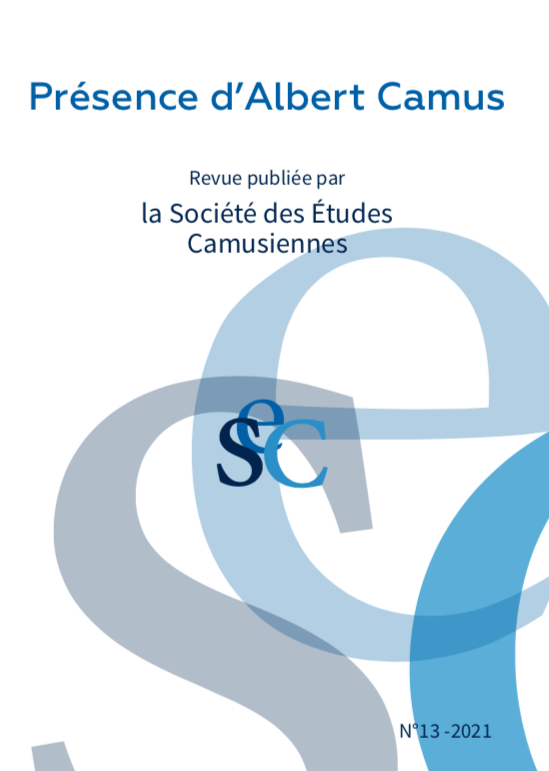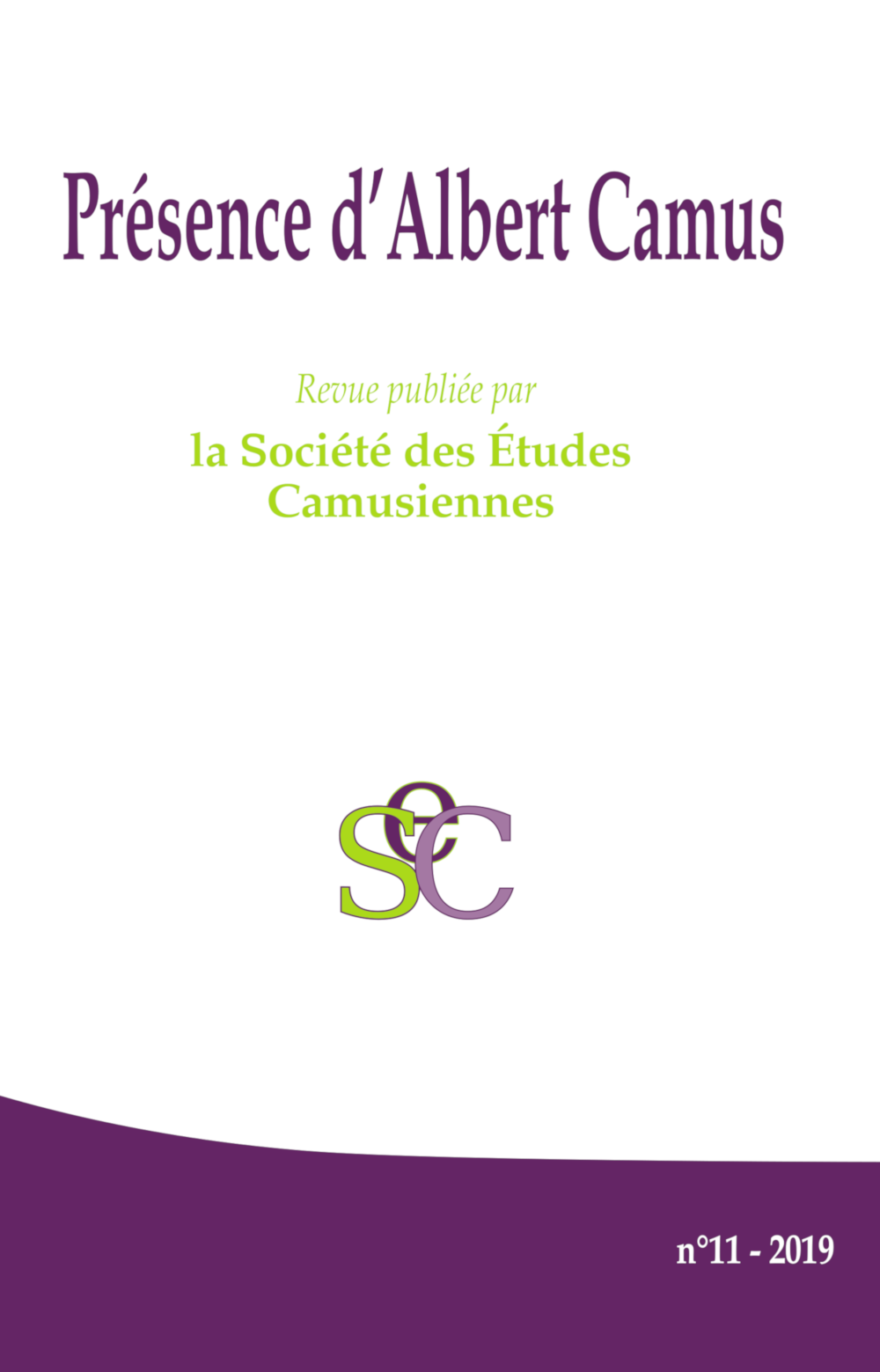(Merci au traducteur Enzo Loï)
Pierre Masson, « Albert Camus, critique littéraire, 1932-1947 »
Existe en Camus un vacío hábilmente mantenido entre el estudiante disipado, que ha crecido en un ambiente analfabeto, en apariencia privado de libros, y el escritor cuyo estilo e imágenes delatan el conocimiento de los clásicos antiguos y modernos. Tal vez sea en esto en lo que el Camus lector se diferencia de los críticos que lo precedieron: poco atento a situar sus lecturas en una perspectiva histórica, a invocar a La Rochefoucauld o a Sainte-Beuve ni tampoco a sus predecesores inmediatos, practica una especie de “lectura salvaje” que le permite, sobre todo, presentar cada libro en función de los problemas del momento, o en función de una reflexión intemporal en la que se inscriben dichos problemas. Finalmente, una actitud próxima a la reflexión filosófica, aplicada al dominio de la literatura en el momento en el que Sartre afirma su historicidad.
Pierre-Louis Rey, « Camus y la Revolución francesa »
Si Camus condena en el El hombre rebelde, como era de esperar, el terrorismo de Estado de 1793, percibe los germenes en la revolución de 1789 y, por debajo de, en la filosofía de la Ilustración, que era culpable de creer en un progreso rectilíneo y ilimitado. El « asesinato » de Luis XVI significó la muerte de Dios, pero otro Dios fue substituido, el Dios de la Razón y de la Virtud, en cuyo nombre era necesario eliminar de la sociedad regenerada los elementos que le eran extraños. Dos figuras dominan las páginas dedicadas en El hombre rebelde a la Revolución francesa : Jean-Jacques Rousseau, inventor de la noción de una Voluntad general que borra la voluntad de todos, y Saint-Just, « arcángel del Terror » que inspiró una extraña fascinación a Camus. A través de su aspiración al Absoluto, que le llevó al crimen y una forma de suicidio, Saint-Just se impone como una figura trágica al que palidecen ellos quien, descuidando toda moral, caerán en el nihilismo.
Kevin Mills, « Victor Malan, un aduanero y un maestro : las másquaras de Jean Grenier en el El primer hombre »
El prefacio a Las Islas es generalmente considerado como el legado de Albert Camus hacia Jean Grenier, hasta el punto de tapar el epílogo novelesco de su diálogo a través de Jacques Cormery y Victor Malan en El primer hombre. El autor dudaba en mantener el tercer capítulo del manuscrito y ese personaje en el que transpuso a su profesor de filosofía ; pero la inconprensíon suscitada por el travestimiento del brillante universitario, del escritor reconocido y del amigo respectado en un aduanero retirado a por mucho tiempo relegado el maestro briochin bajo la sombra de la otra figura de la « busceda del padre », el profesor argelino. Publicadas con trenta y cinco años de diferencia pero escritas concomitantemente, el prefacio a Las Islas y el tercer capítulo del Primer hombre se aclaran mutuamente, revelando una verdad madurada mucho tiempo por Camus sobre las particularidades de su vínculo con Grenier y la universalidad de las relaciones maestro-discípulo.
Hugo Melchior, « Dos Argelinos en busca de « vivir felices, juntos » »
En ese artículo, intetamos explicar por qué, personificando el carácter abigarrado de esa colonia como ninguna otra, la Argelia francesa, y a pesar de todo lo que podía acercalos, incluso unirlos, principalmente una concepción radical de la justicia y esa voluntad común de relacionar a todos lo que viven en la Ciudad argelina, sin excepción, Albert Camus y Messali Hadj, que nunca se han conocido ni han mantenido correspondencia, estaban en total desacuerdo en cuanto del futuro estatus de su patria común.
Demostramos metódicamente que nunca lograron alcanzar une posición consensuada en cuanto a las condiciones jurídicas susceptible de hacer possible ese « vivir felices, juntos », en palabras del escritor, sobre el suelo argelino, dicho de otro modo el marco institucional para alimentar esta nueva « comunidad argelina » que sería la expresión la coexistencia pacífica y armoniosa sobre un mismo territorio entre Argelinos musulmanes y Franceses Argelinos.
Èric Fougère, « Entre Árabes y Franceses: ¿Cuál es la Argelia de Camus? »
Árabe es el que no tiene apellido, al que, recordamos, dispara Meursault. Árabe es el que se queda callado en La mujer adúltera, “extranjero” él mismo, ajeno a la colonia de la que es un habitante sin por ello ser uno de sus ciudadanos. ¿Quién se acuerda de al menos un Árabe oranés en La Peste ? Ausente. Pero ¿porqué no preguntarse lo que significa dicha ausencia, por cierto relativa? Más allá de los asuntos políticos evocados por Camus en sus Crónicas argelinas, uno debe leer El huésped, con el que resulta difícil saber quién, el Árabe o el Europeo, da o recibe la hospitalidad. El “primer hombre” siempre es el extranjero de otro. Dicho de otro modo su prójimo. Si el Árabe puede ser un punto de fuga, de ninguna manera es el punto ciego que algunos quisieran recriminarle a Camus, quien sólo habla de tierra para llorar a los sin tierra y de país para homenajear a los campesinos.
Martine Job, « Camus y el viaje »
Entre los viajes realizados por Camus, hay que distinguir entre los viajes forzados (por motivos de salud o de trabajo) y los viajes voluntarios, y dentro de esos los que responden a peticiones externas y los que son una cuestión de elección personal. En este último caso, surge claramente un tropismo mediterráneo que habla hacia su sensibilidad innata. Aunque Italia fue la destinación más frecuente, Grecia gano su predilección. El interes de ir al extranjero no reside tanto en la exploración de las diferencias como en la oportunidad de enfrentarse a una autoverdad, y Grecia se revela ante él como una parte mítica reconocida instintivamente : le hace recuperar las primeras emociones que experimentó en Argelia o que sintió al leer los textos de la tradició helénica, fundamentos de su pensamiento sobre la relación con el mundo. El viaje, entonces, siempre ha sido para Camus una autoprueba, y lo que es más, como lo muestran varios ejemplos exponidos, una reserva de imágenes y de sensaciones que alimentan el artista que es ante todo. Las notas dispersadas en los Carnets se difractan de manera directa o indirecta en las obras venideras ; la escritura fragmentaria de esas instantáneas continuas da incluso al escritor la opportunidad de poner en práctica, en ciertos lugares, una factura poética consumada.
















